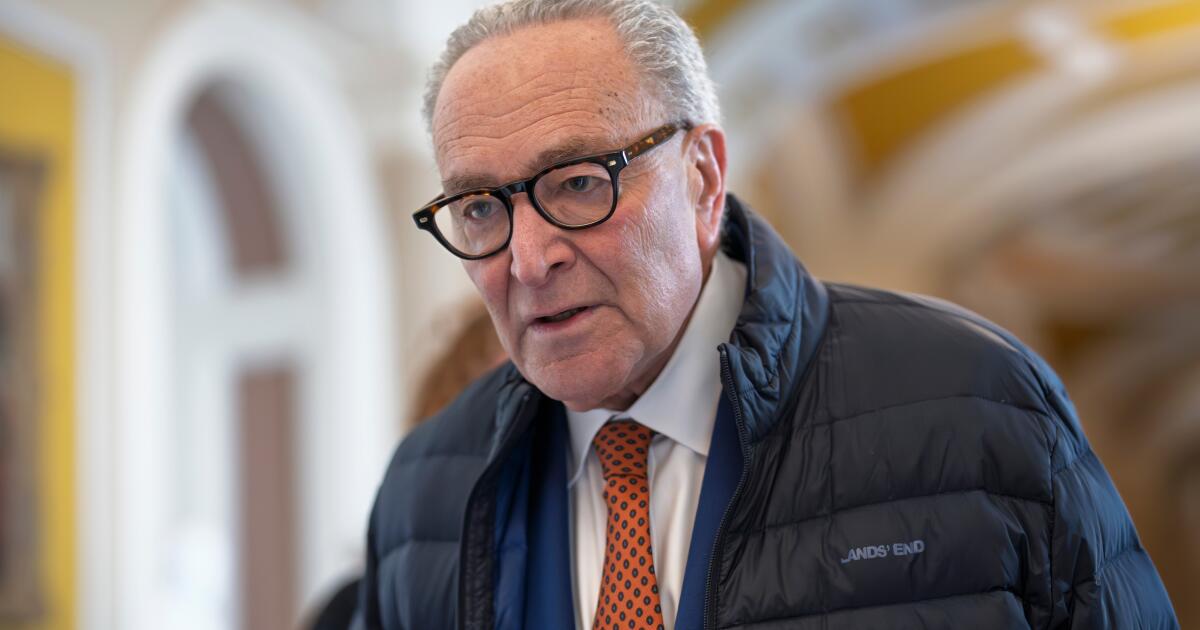Partial federal shutdown seems increasingly likely as Democrats demand major changes to ICE
WASHINGTON — Democratic senators are narrowing a list of demands for changes to U.S. Immigration and Customs Enforcement with a partial government shutdown looming by week’s end, hoping to pressure Republicans and the White House as the country reels from the deaths of two people at the hands of federal agents in Minneapolis.
Senate Minority Leader Chuck Schumer (D-N.Y.) has not yet outlined what his caucus will ask for before a crucial Thursday vote on whether to move forward with spending legislation that funds the Department of Homeland Security and a swath of other government agencies. Democrats were to meet Wednesday and discuss several possible demands, including forcing agents to have warrants and identify themselves before immigration arrests, and they have pledged to block the spending bill in response to the violence.
“This madness, this terror must stop,” Schumer said, calling for immediate changes to ICE and U.S. Border Patrol.
Senate Majority Leader John Thune (R-S.D.) has said he is waiting for Democrats to outline what they want and he suggested that they need to be talking to the White House.
It was unclear how seriously the White House was engaged and whether the two sides could agree on anything that would appease Democrats who are irate after federal agents fatally shot U.S. citizens Renee Good and Alex Pretti this month.
With no evident negotiations underway, a partial shutdown appeared increasingly likely starting Saturday.
Democrats weigh their demands
As the Republican administration pursues its aggressive immigration enforcement surge nationwide, Democrats have discussed several potential demands in the Homeland Security bill.
Those includes requiring judicial warrants for immigration arrests, mandating that federal agents have to identify themselves, ending arrest quotas, sending agents back to the border and forcing DHS to cooperate with state and local authorities in investigations into any incidents such as the two shooting deaths in Minnesota.
Sen. Chris Murphy (D-Conn.) said Democrats are looking at changes that will “unite the caucus, and I think unite the country,” including ending the “roving patrols” that Democrats say are terrorizing Americans around the country.
“None of this is revolutionary,” said Murphy, the top Democrat on the subcommittee that oversees Homeland Security spending. “None of this requires a new comprehensive piece of legislation.”
Schumer and Murphy have said any fixes should be passed by Congress, not just promised by the administration.
“The public can’t trust the administration to do the right thing on its own,” Schumer said.
Republicans say any changes to the spending would need to be passed by the House to prevent a shutdown, and that is not likely to happen in time because the House is not in legislative session this week.
“We can have conversations about what additional oversight is required, what additional laws we should consider, but not at the expense of shutting down the government,” said Sen. John Cornyn (R-Texas).
Many obstacles to a deal
Despite some conversations among Democrats, Republicans and the White House, it was unclear whether there could be a resolution in time to avoid a partial shutdown.
The House passed the six remaining funding bills last week and sent them to the Senate as a package, and that makes it difficult to strip out the Homeland Security portion as Democrats are demanding. Republicans could break the package apart with the consent of all 100 senators, which would be complicated, or through a series of votes that would extend past the Friday deadline.
It was unclear whether President Trump would weigh in.
Republican leaders had hoped to avoid another shutdown after last fall’s 43-day closure that revolved around Democrats’ insistence on extending federal subsidies that make health coverage more affordable for those enrolled in the Affordable Care Act marketplace.
Even if the Senate could resolve the issue, House Republicans have made clear they do not want any changes to the bill they have passed. In a letter to Trump on Tuesday, the conservative House Freedom Caucus wrote that its members stand with the president and ICE.
“The package will not come back through the House without funding for the Department of Homeland Security,” according to the letter.
Democrats say they won’t back down.
“It is truly a moral moment,” said Sen. Richard Blumenthal (D-Conn.). “I think we need to take a stand.”
Jalonick and Freking write for the Associated Press.
